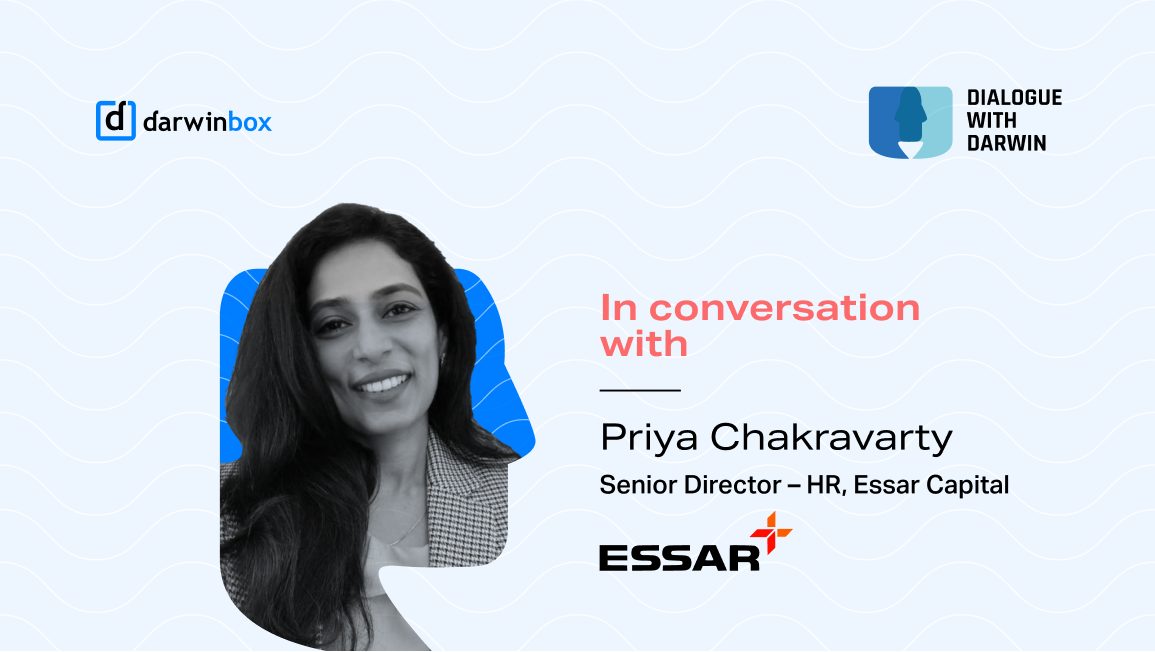
“Changing the wheels of a bus, when the bus is in motion,” is how our next guest on Dialog with Darwin describes the journey of one of India’s biggest corporates ‘Essar’ to aspiring employees. We caught up with Priya Chakravarty, who is Senior Director HR in Essar Capital, for a chat on all things talent optimization. Priya has done her masters from the University of Pennsylvania, with a specialization in organizational dynamics. She has over 20 years of experience in HR and has worked across industries like manufacturing, IT, and Pharma. She is passionate about strengthening organizational culture and people practices.
In this interview, Priya gives us insights on talent management and talent development. She talks about how Essar is managing a distributed and diverse workforce in the hybrid work setup, and some interesting HR initiatives at Essar Capital.
Listen to the full podcast here:
Here are some excerpts from the interview:
Q1: Essar is a conglomerate with a huge and diverse workforce, tell us how you approach talent development within the group?
Priya: In the last few years there has been a lot of consolidation and expansion for Essar. You did mention the fact that it is a conglomerate. In the last two to three years, we have been transitioning from a private equity fund kind of model. So, change is the way we operate. Having said that, because of this transition and transformation journey, reskilling and upskilling are at the forefront of everything that we do.
Q2: An organization's top priority today in a changing business landscape is to reskill and upskill talent. What has your approach been on that front?
Priya: The way we are structured and where we are going in terms of transitioning our business to move to more future-centric and market-centric businesses, one of the big shifts that we have been doing is moving on to more greener businesses.
So, we have taken the opportunity to leverage the internal resources that we have. For example, we are trying to move away from the thermal business and get into more renewables and bio. We have a huge percentage of people who already have that kind of experience. They are currently working in the power business, but they are also double hatting and doing roles in research, working with mentors, etc. with regard to renewables. They’re building knowledge about how this space works and attending symposiums and seminars, and working with experts to try and understand what this new field is all about. So, that is one of the ways we give them exposure.
When they double hat, there is some sense of experiential learning that they get. There is classroom training that we do, there are mentors, we have some mentoring programs where they shadow the CEOs or people in leadership positions so that they get exposure. So, upskilling and reskilling is an ongoing thing by virtue of us being a diversified business.
Q3: What have been some critical policy or approach changes that have been made to enable and engage the remote or hybrid workforce?
Priya: One of the things is using technology in a big way, right from your hiring and onboarding process. I think what we have also tried to do is keep certain nuances of giving you an experience. Let's say a candidate had to walk into a room or the office and experience the culture of the organization. Whether it is the artifacts or just employees walking around in your corridor, just observing them. There are a lot of stories that the walls tell you. We've tried our best in terms of enabling technology to create that kind of experience.
While technology facilitates, I think, more important to me is how you equip your managers to ensure that they ensure very strong trust with your employees or enhance the trust that they already had. If leaders can demonstrate that, even when the times are difficult, we can rally people to go along with you. Especially considering that you are not going to be face-to-face. The other thing is, I think from a cultural point of view, it has always been a culture of people being included in the decision-making process. We want to ensure that people do not get left behind.
Q4: A similar trend that has been disruptive is the war for talent. How are you keeping up with that in making Essar a destination for talent?
Priya: It is about really rolling up the sleeves and building that organization. It's the role that we're able to offer, not only to candidates from within the organization but also to whom we want to attract from the market. That makes it exciting for people to look at us and to say that, yes, I'm going to be part of the growth story of Essar 2.0. An important factor is how we really re-looked at ourselves from a fund perspective. Not just from a portfolio company point of view, but how these funds are set up. For us in a way it's like changing the wheels of the bus when the bus is in motion. How many people get an opportunity to be part of that kind of growth story?
Priya concludes the conversation by sharing her book recommendation, the motto she lives by, and by giving us tips for balancing work and life in the remote setup.
Watch the full interview here:
Do watch other episodes of Dialogue with Darwin here:



Speak Your Mind